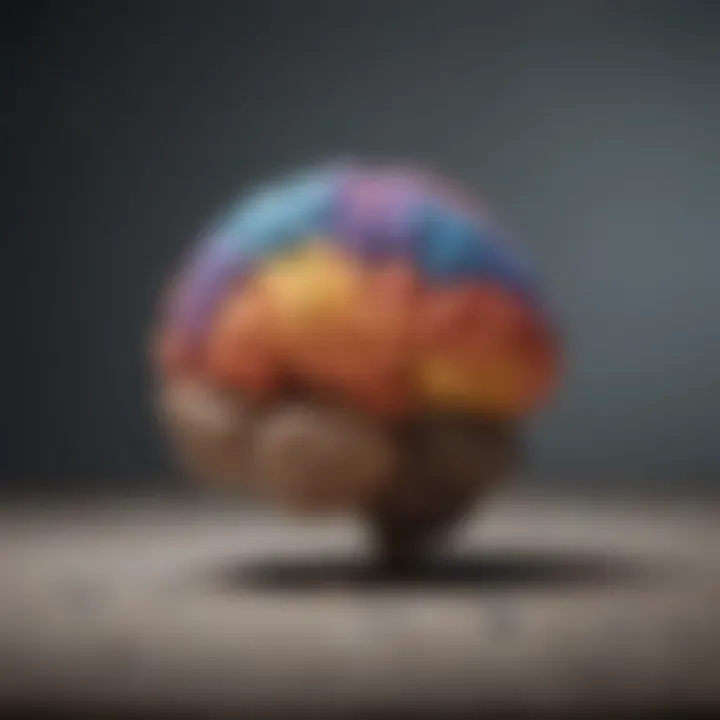Understanding Major Depressive Disorder: An Analytical Perspective


Intro
Major Depressive Disorder (MDD) presents itself as a significant challenge in the realm of mental health. The disorder affects millions worldwide, impacting not only those diagnosed but also their families, friends, and the broader community. This article aims to dissect the intricate components of MDD, shedding light on its underlying factors, symptoms that manifest, possible treatments, and the broader implications for society.
Understanding MDD is essential for various stakeholders including students, educators, healthcare professionals, and researchers. By examining the multifactorial nature of this disorder, one can appreciate the complexity behind its diagnosis and management.
Overview of Research Topic
Brief Background and Context
MDD is not merely a fleeting feeling of sadness. It is a complex condition characterized by persistent low mood, loss of interest, and varied cognitive and physical symptoms. The disorder can stem from numerous factors, including genetic predispositions, environmental influences, and neurobiological processes.
Societal acceptance of mental health issues has improved over the years, yet MDD still bears a stigma that complicates treatment possibilities. Therefore, exploring MDD allows for a more profound grasp of its implications not just on individual lives, but on societal health as well.
Importance in Current Scientific Landscape
In recent years, significant advances have been made in understanding the etiology of MDD. Ongoing research delves into biological, psychological, and environmental dimensions. According to a report by the World Health Organization, depression is a leading cause of disability globally, which underscores the critical need for comprehensive analysis and treatment strategies.
"Depression is a common mental disorder. Globally, more than 264 million people of all ages suffer from depression".
As researchers push forward, there remains an imperative need to connect scientific discovery with the treatment frameworks currently in place for healthcare providers.
Methodology
Research Design and Approach
The methodological framework used in the research of MDD typically involves a combination of literature review, empirical studies, and statistical analysis. Contextualizing MDD within clinical and social parameters aids in painting a fuller picture of the disorder's complexity.
Data Collection Techniques
Data related to MDD is gathered through various channels. Surveys, clinical assessments, and meta-analyses form the backbone of data collection in this field. Additionally, observational studies and longitudinal research contribute valuable insight into the long-term effects of the disorder on individuals and communities.
The findings from these studies can significantly inform treatment modalities and policies aimed at reducing the impact of MDD in society.
Defining Major Depressive Disorder
Defining Major Depressive Disorder (MDD) is fundamental for grasping its complexities and implications. A clear definition allows for better understanding, diagnosis, and treatment of this pervasive mental health condition. Knowing what MDD entails helps healthcare providers differentiate it from other mood disorders, thus ensuring patients get appropriate care.
Clinical Definition
Major Depressive Disorder is characterized by a persistent feeling of sadness or a lack of interest in external stimuli. According to the Diagnostic and Statistical Manual of Mental Disorders (DSM-5), for a diagnosis of MDD, an individual must experience five or more of the following symptoms over a two-week period:
- Depressed mood for most of the day
- Markedly diminished interest in activities
- Significant weight loss or gain
- Insomnia or excessive sleeping
- Fatigue or loss of energy
- Feelings of worthlessness or excessive guilt
- Diminished ability to think or concentrate
- Recurrent thoughts of death or suicide
This clinical definition outlines the emotional, cognitive, and physical dimensions that individuals with MDD endure. Recognizing these criteria fosters a more informed approach to treatment and support.
Historical Context
The understanding of Major Depressive Disorder has evolved significantly over time. Historically, concepts of depression have been present in various cultures and epochs. Early interpretations often confined depression to a moral failing or spiritual deficit.
In the 20th century, the emergence of psychological theories marked a turning point. Sigmund Freud regarded depression as a response to loss, examining the inner turmoil associated with it.
With advancements in research, the medical perspective began to dominate. The work of Emil Kraepelin in the late 19th century helped map out the clinical characteristics and classifications of mood disorders, which laid foundations for present-day psychiatry.
Prevalence and Impact
The relevance and significance of Major Depressive Disorder cannot be overstated. Statistically, MDD is one of the most common mental health disorders globally. According to the World Health Organization, over 264 million people suffer from depression, making it prevalent across various populations.
The impact of MDD is profound, affecting not only the individual but also families, workplaces, and societies. It can result in loss of productivity, increased healthcare costs, and strained relationships. An understanding of the prevalence rates assists in mobilizing resources for treatment and awareness campaigns.
"Major Depression is ranked as the single largest contributor to global disability."
Recognizing the significant burden of Major Depressive Disorder highlights the necessity for continued research, adequate mental health resources, and public awareness campaigns.
Diagnostic Criteria
The importance of Diagnostic Criteria in the understanding and treatment of Major Depressive Disorder (MDD) cannot be understated. These criteria serve as a standardized framework for identifying and diagnosing this complex mental health condition. An accurate diagnosis is crucial not only for effective treatment but also for ensuring the individual receives appropriate support.
Diagnostic criteria help clinicians delineate MDD from other mental health disorders. This ensures that the underlying issues are properly addressed. Additionally, uniform criteria facilitate research, enabling scientists to collect data that is consistent and reliable. This data can inform treatment approaches and enhance our understanding of MDD’s etiology.
With that said, two major classification systems dominate the landscape of mental health diagnosis: the DSM-5 and ICD-10. Each system provides guidelines that healthcare providers follow to diagnose MDD, contributing to a structured approach in mental health care.
DSM-5 Criteria
The DSM-5 outlines specific criteria for diagnosing Major Depressive Disorder. According to this reference, a person must exhibit a minimum of five symptoms during the same two-week period. This period includes at least one symptom that reflects either depressed mood or loss of interest or pleasure.
The symptoms detailed in the DSM-5 criteria include:
- Persistent sad or low mood most of the day
- Loss of interest or pleasure in activities once enjoyed
- Significant weight loss or gain, or changes in appetite
- Difficulty sleeping or sleeping excessively
- Psychomotor agitation or retardation
- Fatigue or loss of energy
- Feelings of worthlessness or excessive or inappropriate guilt
- Difficulty concentrating or making decisions
- Recurrent thoughts of death or suicidal ideation
Even though the DSM-5 provides a clear outline, it is essential to consider the context of these symptoms in an individual patient. Personal history and social circumstances may heavily influence the diagnosis.
ICD-10 Classification


The ICD-10, maintained by the World Health Organization (WHO), also provides a robust classification for mental disorders, including Major Depressive Disorder. The classification system groups MDD into different types, which can help in tailoring treatment methodologies based on the specific circumstances of the individual.
Among these classifications are:
- Severe depressive episode
- Moderate depressive episode
- Mild depressive episode
- Recurrent depressive disorder
- Dysthymia
Each classification considers the duration, severity, and recurrence of the depressive episodes, allowing for a more nuanced understanding of the disorder. This specificity is pivotal, as it informs healthcare providers about the suitable treatment options available for the given situation.
Bipolar vs. Unipolar Depression
Understanding the distinction between unipolar and bipolar depression is essential in identifying the right course of treatment. Unipolar depression, as the name suggests, refers specifically to Major Depressive Disorder where the focus is on depressive episodes only. This condition is marked by enduring feelings of sadness or hopelessness without the alternating periods of mania that characterize bipolar disorder.
On the other hand, Bipolar Disorder includes swings between depressive and manic or hypomanic states. This can complicate the treatment strategy, as medications that work for unipolar depression may not be suitable for those with bipolar disorder.
Recognizing these differences enhances treatment effectiveness. This understanding allows healthcare providers to design more effective interventions tailored to the individual's condition and history. Patients often benefit from specific therapies that address their unique patterns of mood disturbances.
"Accurate diagnosis is the cornerstone of effective treatment for Major Depressive Disorder."
Etiology of Major Depressive Disorder
The etiology of Major Depressive Disorder (MDD) is fundamental to understanding its development and progression. This section examines the complexities of various biological, psychological, social, and environmental factors contributing to MDD. Recognizing these elements is essential for effective prevention, diagnosis, and treatment strategies. Understanding etiology not only informs clinical practices but also enhances awareness about the multifaceted nature of MDD, allowing for more effective patient care across different contexts.
Biological Factors
Genetic Predisposition
Genetic predisposition is a significant aspect of the biological factors contributing to MDD. It suggests that certain individuals have a hereditary risk for developing depression based on their family history. Studies have shown that first-degree relatives of individuals with MDD have a higher likelihood of developing the disorder themselves.
The key characteristic of genetic predisposition is the heritability of the disorder. This genetic link highlights why it is a critical choice for this article. It provides insight into how family genetics can influence mental health. The unique feature of genetic predisposition lies in its potential for early identification. This can lead to timely interventions, although it also poses the disadvantage of fatalism, where individuals might feel powerless in the face of their genetic risk.
Neurochemical Imbalances
Neurochemical imbalances play a crucial role in the onset of MDD. Changes in neurotransmitters such as serotonin, norepinephrine, and dopamine are common in individuals suffering from depression. These chemical changes can disrupt mood regulation, which is vital for emotional well-being.
The key characteristic of neurochemical imbalances is that they often respond to pharmacological treatments. This makes it a relevant topic for this article, as understanding these imbalances can guide treatment decisions. A unique advantage of discussing neurochemical factors is their direct link to specific medications, such as SSRIs. However, a disadvantage is that focusing solely on neurochemistry can overlook psychological and social dimensions of depression.
Brain Structure Abnormalities
Brain structure abnormalities refer to differences in physical brain structure that are associated with MDD. Imaging studies have indicated changes in areas such as the prefrontal cortex and amygdala in those with depression. These changes can affect emotional regulation and cognitive function.
The key characteristic of these abnormalities is that they provide a biological basis for symptoms of depression. This makes it a compelling point for this article, emphasizing the physiological aspects of MDD. A major advantage of exploring brain structure is the potential for developing targeted interventions. On the downside, focusing too heavily on brain structure can lead to an oversimplification of a widely complex disorder.
Psychological Factors
Cognitive Distortions
Cognitive distortions are patterns of negative thinking that affect emotions and behaviors. This is a significant psychological aspect that contributes to MDD. These distortions can manifest as negative self-talk or pessimistic views about the world.
A key characteristic of cognitive distortions is their learned nature, which means they can be unlearned through therapy. This makes it an appealing focus for this article. Discussing cognitive distortions helps identify therapeutic strategies aimed at reframing these thoughts. However, a potential disadvantage is that it may lead to oversimplifying the cognitive aspects of depression, failing to recognize biological or environmental influences.
Stress Response
The stress response system is a physiological and psychological reaction that occurs in response to stressors. Chronic stress is known to increase the risk for MDD. This aspect is crucial to understanding how external pressures can lead to the development of depressive symptoms.
A key characteristic of the stress response is that it can be activated by both acute and chronic stressors, making it relevant in various life contexts. Highlighting this in the article showcases the importance of coping mechanisms. A unique feature is the opportunity for preventive strategies, such as stress management techniques. However, the disadvantage lies in the difficulty of measuring stress response variations accurately.
Trauma and Adverse Life Events
Trauma and adverse life events are significant contributors to the onset of MDD. Experiences such as abuse, loss, or major life changes can trigger depressive episodes. Understanding this factor helps in assessing risk and implementing preventive measures.
The key characteristic here is the profound impact of life circumstances on mental health. It is a pertinent topic for this article because it connects individual experiences to broader mental health issues. The unique advantage of addressing this topic lies in raising awareness about the need for supportive interventions. However, a disadvantage is that not all individuals exposed to trauma develop depression, indicating a complex interplay with other factors.
Social and Environmental Factors
Socioeconomic Status
Socioeconomic status (SES) is an important social factor that influences the risk of developing MDD. Individuals from lower SES backgrounds face multiple stressors, including financial instability and lack of access to resources. This factor is relevant because it affects both mental health directly and indirectly.
The key characteristic of SES is that it highlights inequalities in mental health outcomes, emphasizing the need for accessible mental health care. This makes it a salient focus for this article. A unique feature is that it opens discussions about public policy and social justice. On the downside, attributing mental health solely to SES can overlook individual resilience and coping factors.
Social Support Systems
Social support systems play a critical role in the mental health of individuals. Strong support networks can buffer against the effects of stress and promote recovery from MDD. The importance of this factor lies in its protective effects on mental health.
A key characteristic of social support is that it can be both emotional and instrumental, providing different forms of assistance. This is a beneficial topic for this article, as it underscores the importance of community in mental health. The unique advantage is that strengthening social bonds can be an effective intervention. However, reliance on social support can lead individuals to overlook personal responsibility in managing their mental health.
Workplace and Family Dynamics
Workplace and family dynamics significantly influence mental health, particularly regarding stress and support. A negative work environment or family strain can exacerbate depressive symptoms, while supportive work and family members can promote resilience.
The key characteristic here is the interplay between individual behavior and environmental factors. This topic is relevant for this article, highlighting the contextual nature of MDD. A unique feature is its potential for targeted interventions at both family and organizational levels. However, focusing solely on relationships could lead to ignoring personal agency and other contributing factors.
Symptoms of Major Depressive Disorder
Understanding the symptoms of Major Depressive Disorder (MDD) is essential for several reasons. Firstly, these symptoms are the gateway to diagnosis and provide insight into the severity and nature of the condition. Recognizing these signs early can lead to timely intervention, which is critical in preventing further deterioration of mental health. Additionally, comprehending the spectrum of symptoms aids healthcare providers and caregivers in crafting effective treatment plans tailored to individual needs.
The following sections will delve into the emotional, cognitive, and physical symptoms associated with MDD, offering detailed descriptions that enrich understanding of this disorder.
Emotional Symptoms
Persistent Sadness
Persistent sadness stands as a cornerstone emotional symptom of MDD. Individuals often experience a profound sense of sorrow that endures for weeks or even months. This symptom manifests not just as fleeting sadness but as a pervasive feeling that colors one’s perspective on life. It is crucial for understanding the depth of suffering experienced by those grappling with depression. This heightened emotional state can lead to withdrawal from activities that were once enjoyable, further isolating the individual. The exploration of persistent sadness in this article underscores its role as a fundamental characteristic that influences both the individual and their surroundings.
Feelings of Hopelessness
Feelings of hopelessness often accompany persistent sadness. Individuals may perceive their situation as unchangeable, leading to despair. This perspective can stifle motivation and create a sense of futility regarding efforts to improve one’s life. Understanding this symptom is crucial, as it fuels a cycle of negative thinking and perpetuates the disorder. Moreover, hopelessness can significantly affect decision-making and relationships, emphasizing its importance in the overall discussion of MDD. The inclusion of this symptom serves to highlight the profound impact of negative emotional states on individuals' lives.
Irritability
Irritability is another emotional symptom frequently observed in those with MDD. It manifests as increased agitation and frustration over minor issues. This aspect is notable because it can impact personal and professional relationships. Moreover, irritability can often be overlooked or misunderstood by others, leading to further isolation of the individual experiencing MDD. Understanding this symptom provides insight into the varied expressions of depression beyond sadness, enriching the overall discussion in the article. Its inclusion emphasizes the multifaceted nature of emotional responses associated with MDD.


Cognitive Symptoms
Difficulty Concentrating
Difficulty concentrating is a prevalent cognitive symptom of MDD. This difficulty can hinder daily functioning at work or in academic settings. Individuals may find it hard to focus on tasks, leading to feelings of inadequacy and frustration. Recognizing this symptom also allows for a broader understanding of how MDD can affect a person's intellectual engagement and quality of life. By addressing these cognitive challenges, strategies can be developed to support individuals in maintaining productivity. Therefore, this symptom is crucial to addressing how depression impacts cognitive function.
Indecisiveness
Indecisiveness is another cognitive symptom that complicates daily life. Individuals may struggle to make even simple decisions, leading to paralysis in their personal and professional life. This symptom amplifies feelings of worthlessness and inadequacy. Understanding indecisiveness in the context of MDD offers valuable insights into the cognitive impairments associated with the disorder. It highlights the need for supportive interventions that can alleviate some of the burdens faced by individuals.
Negative Thinking Patterns
Negative thinking patterns represent a pervasive cognitive symptom in MDD. This pattern involves constant rumination on past failures and a bleak outlook on the future. Such thinking can maintain and perpetuate mental health issues, creating a vicious cycle. Recognizing this symptom is beneficial within this article, as it opens discussions on interventions targeting cognitive restructuring. Addressing this issue is vital for assisting individuals in shifting their perceptions and ultimately fostering recovery.
Physical Symptoms
Changes in Sleep Patterns
Changes in sleep patterns are common physical symptoms of MDD. Individuals may experience insomnia or hypersomnia, significantly impacting their energy levels and overall functionality. Understanding these sleep disturbances is important, as they can exacerbate other symptoms and lead to a decline in physical health. This illustrates the interconnectedness of mental and physical health, thus providing a holistic view in this article. Addressing sleep issues can lead to improvements in treatment effectiveness, making this symptom a significant area of focus.
Alterations in Appetite
Alterations in appetite often emerge as significant physical symptoms of depression. Some individuals may lose interest in food, while others might overeat as a coping mechanism. This variability can lead to considerable weight fluctuations, impacting health and self-image. Understanding how appetite changes affect individuals is essential for developing comprehensive treatment strategies. This topic underscores the importance of monitoring physical health alongside mental health in managing MDD.
Unexplained Aches and Pains
Unexplained aches and pains are common among individuals with MDD. Patients might report chronic pain with no identifiable medical cause. This symptom showcases the mind-body connection inherent in mental health disorders. Recognizing that such physical symptoms can often point to underlying psychological distress encourages a more integrated approach to treatment. Addressing this symptom in the article emphasizes the need for a thorough examination of all dimension of an individual’s health when dealing with MDD.
Recognizing the symptoms of Major Depressive Disorder not only aids in immediate diagnosis but also fosters a deeper understanding of the individual's experience, ultimately leading to more targeted and effective interventions.
Treatment Options for Major Depressive Disorder
The treatment options for Major Depressive Disorder (MDD) are essential to understand, as they significantly impact both the individual's recovery and overall quality of life. Effective treatments are vital because MDD can manifest in various ways, affecting every aspect of a person's existence. The objective of treatment options is not just symptom relief, but also to equip patients with coping mechanisms and resilience against future episodes of depression. Furthermore, the combination of different treatment modalities can lead to better outcomes than relying on a single approach.
Psychotherapy Approaches
Cognitive Behavioral Therapy
Cognitive Behavioral Therapy (CBT) is a prominent psychotherapy approach that focuses on the connection between thoughts, feelings, and behaviors. It is structured and goal-oriented, which helps patients identify and change negative thinking patterns. CBT is popular in treating MDD due to its evidence-based effectiveness. Its unique feature lies in the emphasis on developing practical skills that patients can apply in their everyday life, fostering self-efficacy. Benefits include shorter duration of treatment, as patients may experience significant improvements in relatively few sessions. However, not all individuals may find CBT entirely effective, and some may require additional forms of therapy.
Interpersonal Therapy
Interpersonal Therapy (IPT) addresses the interpersonal relationships and social roles that may contribute to depression. The core idea of IPT is that improving interpersonal relationships can relieve depressive symptoms. This therapy is beneficial because it targets specific social factors, such as grief, role disputes, or social deficits, making it a tailored approach. The downside is that IPT can sometimes take longer to show results compared to other therapies. Nevertheless, it remains an important option, particularly for those whose depression is rooted in relational issues.
Mindfulness-Based Therapy
Mindfulness-Based Therapy blends traditional cognitive therapies with mindfulness practices. This approach encourages individuals to focus on the present moment without judgment, enhancing self-awareness. It is increasingly popular because it teaches patients to manage anxiety and reduce depressive symptoms through mindfulness techniques. The unique feature of this therapy is that it not only addresses the symptoms of MDD but also promotes emotional regulation and increased overall mental well-being. However, practicing mindfulness may require consistent effort, and some individuals may find it challenging to adopt these techniques into their daily life.
Pharmacological Treatments
Antidepressants
Antidepressants are often considered the first-line pharmacological treatment for Major Depressive Disorder. These medications work by altering neurochemical imbalances in the brain, improving mood and emotional balance. The key characteristic of antidepressants is their variety; they include selective serotonin reuptake inhibitors (SSRIs), serotonin-norepinephrine reuptake inhibitors (SNRIs), and atypical antidepressants. They are beneficial primarily because they can enhance emotional state relatively quickly. Yet, side effects and the time it may take to find the right medication can be considerable drawbacks.
Neuromodulation Techniques
Neuromodulation techniques encompass several modern strategies aimed at restoring normal brain function. These include Transcranial Magnetic Stimulation (TMS) and Electroconvulsive Therapy (ECT). TMS is non-invasive and can provide relief without the systemic side effects of medications. Its key attribute is the stimulation of specific areas in the brain related to mood regulation. While ECT is effective for severe cases, it may induce memory issues, which need careful consideration. Neuromodulation represents an important evolution in MDD treatment, offering options when traditional methods do not suffice.
Future Pharmacological Targets
Future pharmacological targets in MDD treatment are an exciting area of research. Scientists are exploring substances like ketamine and new formulation of psychedelics, which can offer rapid relief of symptoms. These newer options provide hope for patients who do not respond well to existing treatments. The key characteristic is the potential for rapid action, significantly different from traditional antidepressants that may take weeks to work. However, much is still unknown about their long-term effects and safety, necessitating ongoing investigation and ethical consideration.
Integrative and Alternative Therapies
Nutritional Interventions
Nutritional interventions involve dietary changes aimed at improving mental health. Nutritional psychiatry is a growing field, pointing out the links between diet and mood. This approach becomes significant because the brain requires various nutrients for optimal functioning. Following a balanced diet rich in Omega-3 fatty acids and antioxidants may offer benefits in managing depressive symptoms. The challenge, however, is that dietary changes alone often won’t suffice as stand-alone treatments for MDD.
Exercise Therapy
Exercise therapy promotes physical activity as a means to combat depression. Engaging in regular exercise can elevate mood and reduce anxiety, acting as both a preventive and therapeutic measure for MDD. The most notable aspect is that exercise releases endorphins, natural mood lifters. Despite the numerous benefits, initial resistance to starting an exercise program can be a barrier for many patients, yet even small amounts of physical activity can yield positive results.
Complementary Approaches
Complementary approaches include methods such as yoga, acupuncture, and meditation that can support traditional treatment modalities. They can enhance overall well-being and reduce symptoms when used alongside standard treatments. One key feature is their holistic nature, addressing both body and mind. However, the scientific backing for some of these approaches can vary, so it is essential to approach them with cautious openness, ensuring that they complement rather than replace evidence-based treatments.
In summary, the landscape of treatment options for Major Depressive Disorder is diverse and evolving. Each option has its unique strengths and considerations, necessitating individualized treatment planning for effective management.
Challenges in Treatment
The treatment landscape for Major Depressive Disorder is complex and fraught with obstacles. Understanding these challenges is crucial for healthcare providers, patients, and researchers alike. Addressing these issues can lead to improved treatment adherence and better outcomes. These challenges encompass various facets such as resistance to treatment, side effects of medications, and societal stigmas. By navigating these hurdles, caregivers can devise more effective strategies for managing depression.
Resistance to Treatment


Resistance to treatment is a significant barrier faced by many individuals with Major Depressive Disorder. This can stem from various factors. Some patients may not respond to standard treatment protocols. Others might have a unique biochemical makeup that alters their response to medications. In some cases, individuals may be hesitant to seek help due to previous negative experiences with mental health care.
The phenomenon of treatment resistance can have profound implications. It prolongs suffering and increases the likelihood of recurring episodes of depression. For clinicians, identifying alternative treatment strategies becomes essential. This could include switching to different classes of antidepressants, introducing psychotherapy methods or considering neuromodulation techniques like transcranial magnetic stimulation (TMS).
Side Effects of Medications
Another hurdle in the treatment of Major Depressive Disorder involves the side effects associated with medications. While antidepressants can be effective, they often come with undesirable side effects. Common issues related to antidepressant medications include weight gain, sexual dysfunction, and gastrointestinal problems. These side effects can discourage patients from adhering to their prescribed treatment regimens.
"Understanding medication-related side effects is key to ensuring treatment compliance. Addressing side effects early in treatment can mitigate the risk of discontinuation."
Clinicians must have open discussions with patients about potential side effects. Informed decision-making allows individuals to weigh the benefits against the drawbacks. Alternative approaches, such as mindfulness and nutritional interventions, can also complement pharmacological treatments and help alleviate side effects.
Societal Stigmas
Societal stigmas associated with Major Depressive Disorder pose a considerable challenge in treatment. Stigma can prevent individuals from seeking help or discussing their struggles openly. This lack of communication often leads to isolation and worsens the symptoms of depression. Public perception of mental health varies significantly across cultures, and misconceptions about depression can hinder progress.
Moreover, societal attitudes may discourage individuals from initiating treatment. They may fear embarrassment or judgment from friends, family, or colleagues. Advocacy for mental health awareness is vital in combating these stigmas. Educating the public about depression can facilitate a more supportive environment for those in need.
Prognosis and Long-term Outcomes
Understanding the prognosis and long-term outcomes for individuals affected by Major Depressive Disorder is crucial. It allows healthcare professionals and patients alike to gauge what to expect and how to plan for the future. The implications of MDD reach beyond clinical symptoms, influencing personal relationships, work productivity, and overall life satisfaction. Knowing how these aspects intertwine can promote more effective management strategies and foster resilience among those affected.
Recovery Rates and Risk of Recurrence
Recovery from Major Depressive Disorder is achievable; however, the journey often poses challenges. Research indicates that approximately 60% of individuals with MDD respond positively to initial treatments, which may include a combination of psychotherapy and pharmacotherapy. Despite these encouraging recovery rates, the risk of recurrence remains significant. Statistics show that about 50% of individuals will experience a relapse within two years after recovery. This high rate of recurrence underscores the need for continuous monitoring and possibly ongoing treatment even after symptoms have improved. Individuals who have experienced multiple episodes of depression face an even higher risk of future episodes, reaching up to 90% after three episodes. Thus, understanding these dynamics is essential for developing personalized treatment plans that address the unique history and needs of each patient.
Impact on Quality of Life
The effects of Major Depressive Disorder extend deeply into various facets of life. Quality of life can diminish significantly due to depressive symptoms, affecting relationships, professional life, and personal fulfillment. Many individuals report feelings of hopelessness and a lack of interest in previously enjoyable activities. This leads to withdrawal from social networks, resulting in feelings of isolation and loneliness. Moreover, the cognitive symptoms associated with MDD, such as difficulty concentrating and indecisiveness, can hinder academic and career performance. According to studies, individuals with MDD are more likely to face long-term disability and diminished work capacity. Addressing these aspects is vital for holistic recovery, emphasizing the need for tailored support systems that address emotional, cognitive, and social needs.
Economic Implications
The economic burden of Major Depressive Disorder is significant and multifaceted. It extends beyond direct healthcare costs, encompassing lost productivity and increased disability claims. Estimates suggest that the total economic impact of depression on society can exceed $200 billion annually in the United States alone. This figure reflects costs associated with medications, therapy, hospitalization, and displacement from work.
Furthermore, untreated or inadequately managed depression can lead to co-morbidities such as cardiovascular diseases or substance abuse issues, adding to healthcare expenses. Addressing MDD effectively can reduce these economic implications, highlighting the merit of investing in mental health services, preventive measures, and public health initiatives aimed at reducing the stigma surrounding mental health issues.
"The proactive management of Major Depressive Disorder not only benefits individuals but can also significantly alleviate the economic strain on healthcare systems and society."
In summary, understanding the prognosis and long-term outcomes associated with Major Depressive Disorder informs both treatment strategies and policy decisions. Enhanced recovery rates and their management, assessment of quality of life, and acknowledgment of economic implications represent a vital framework for advancing mental health care.
Future Directions in Research
The exploration of Major Depressive Disorder (MDD) continues to evolve. The field of research is making significant strides in understanding this complex condition. Focusing on future directions in research can yield immense benefits. It can refine existing treatments, uncover new therapies, and ultimately improve patient outcomes.
Emerging Biomarkers
Biomarkers are measurable indicators of biological processes or conditions. In the context of MDD, emerging biomarkers hold promise for diagnosis and treatment. They can provide objective measures to complement subjective evaluations.
Current research is investigating genetic, neurobiological, and inflammatory markers that may correlate with depression's intensity or resistance to treatment. Identifying such biomarkers can lead to more personalized approaches to managing MDD. For instance, if a specific biomarker indicates a higher likelihood of treatment resistance, clinicians can adjust medication strategies early in the treatment process.
Ultimately, this approach not only enhances the patient's care experience but also streamlines healthcare resources.
Novel Therapeutic Targets
Research into novel therapeutic targets is crucial. Traditional drugs, primarily antidepressants, often fall short for many individuals. Therefore, scientists are exploring new mechanisms to intervene.
Several pathways are proving to be of interest:
- Neuroinflammation: Reducing inflammation in the brain may alleviate depressive symptoms.
- Neuroplasticity: Promoting brain adaptability can help counteract the effects of MDD.
- Gut-brain axis: Involvement of microbiota in mental health is gaining attention. Alteration of gut bacteria could potentially serve as a new therapeutic avenue.
Additionally, treatments like ketamine and other psychedelic substances are under scrutiny. These have shown rapid effects on depression and may work through different mechanisms than traditional antidepressants.
Technology in Treatment Delivery
The integration of technology into treatment delivery represents a significant shift in mental health care. Accessibility is a prevalent issue facing many individuals with MDD. Technology can bridge this gap.
Teletherapy is one promising development, allowing patients to engage in therapy from their homes. This can be particularly beneficial for those living in rural areas or with mobility issues. Moreover, mobile applications designed for mood tracking and skill-building can further support patients outside traditional clinical settings.
Virtual reality and artificial intelligence are also being explored. VR can create immersive environments for exposure therapy, while AI can help tailor treatment plans based on patients’ progress.
"The intersection of technology and mental health care can transform how we approach conditions like Major Depressive Disorder."
In summary, future research directions in the field of MDD promise enhancements in diagnosis, treatment, and delivery methods. These advancements can lead to a more effective and personalized approach to managing this pervasive condition.
Finale
The conclusion provides a vital synthesis of the information presented throughout this article. It serves to reinforce the complexity and multifactorial nature of Major Depressive Disorder (MDD). A clear understanding of MDD is crucial both for the individuals affected by it and for the professionals who seek to provide appropriate care and support.
Key Takeaways
MDD remains a significant global health issue, affecting millions of people across diverse demographics. It is pivotal to recognize the following points:
- Complex Diagnostic Criteria: Understanding the diagnostic criteria, such as those defined in the DSM-5 and ICD-10, is essential for accurate identification of MDD.
- Variety of Symptoms: MDD presents with emotional, cognitive, and physical symptoms, often complicating its portrayal and acknowledgment.
- Diverse Treatment Options: Options include psychotherapy, pharmacological treatments, and alternative therapies. Each individual must find a treatment or a combination that works best for their unique situation.
- Societal Impact: The economic implications of MDD are profound, affecting not only the individuals but also workplaces and communities.
- Continued Research: The field of mental health needs ongoing research to uncover new therapeutic targets and improve outcomes for those suffering from MDD.
Call for Awareness and Advocacy
Raising awareness about Major Depressive Disorder is crucial. There are several reasons for this:
- Stigmatization: Societal stigma surrounding mental health can lead to isolation and reluctance in seeking help. Advocacy can help combat this stigma.
- Education: Increased awareness leads to better understanding among the public, which can facilitate early detection and intervention for those suffering from MDD.
- Policy Change: Advocacy efforts can promote changes in healthcare policies that ensure better access to mental health services.
- Focus on Research Funding: Highlighting the importance of MDD can influence funding allocation towards research, ultimately benefiting treatment advancements.



